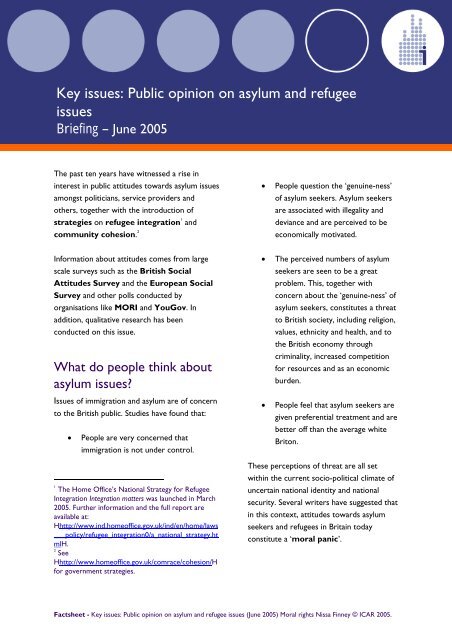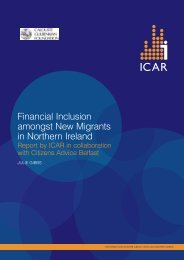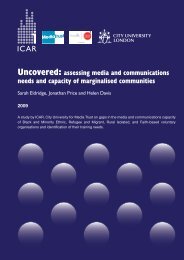Key issues: Public opinion on asylum and refugee issues - ICAR
Key issues: Public opinion on asylum and refugee issues - ICAR
Key issues: Public opinion on asylum and refugee issues - ICAR
You also want an ePaper? Increase the reach of your titles
YUMPU automatically turns print PDFs into web optimized ePapers that Google loves.
<str<strong>on</strong>g>Key</str<strong>on</strong>g> <str<strong>on</strong>g>issues</str<strong>on</strong>g>: <str<strong>on</strong>g>Public</str<strong>on</strong>g> <str<strong>on</strong>g>opini<strong>on</strong></str<strong>on</strong>g> <strong>on</strong> <strong>asylum</strong> <strong>and</strong> <strong>refugee</strong><br />
<str<strong>on</strong>g>issues</str<strong>on</strong>g><br />
Briefing – June 2005<br />
The past ten years have witnessed a rise in<br />
interest in public attitudes towards <strong>asylum</strong> <str<strong>on</strong>g>issues</str<strong>on</strong>g><br />
am<strong>on</strong>gst politicians, service providers <strong>and</strong><br />
others, together with the introducti<strong>on</strong> of<br />
strategies <strong>on</strong> <strong>refugee</strong> integrati<strong>on</strong> 1 <strong>and</strong><br />
community cohesi<strong>on</strong>. 2<br />
• People questi<strong>on</strong> the ‘genuine-ness’<br />
of <strong>asylum</strong> seekers. Asylum seekers<br />
are associated with illegality <strong>and</strong><br />
deviance <strong>and</strong> are perceived to be<br />
ec<strong>on</strong>omically motivated.<br />
Informati<strong>on</strong> about attitudes comes from large<br />
scale surveys such as the British Social<br />
Attitudes Survey <strong>and</strong> the European Social<br />
Survey <strong>and</strong> other polls c<strong>on</strong>ducted by<br />
organisati<strong>on</strong>s like MORI <strong>and</strong> YouGov. In<br />
additi<strong>on</strong>, qualitative research has been<br />
c<strong>on</strong>ducted <strong>on</strong> this issue.<br />
What do people think about<br />
<strong>asylum</strong> <str<strong>on</strong>g>issues</str<strong>on</strong>g><br />
Issues of immigrati<strong>on</strong> <strong>and</strong> <strong>asylum</strong> are of c<strong>on</strong>cern<br />
to the British public. Studies have found that:<br />
• People are very c<strong>on</strong>cerned that<br />
immigrati<strong>on</strong> is not under c<strong>on</strong>trol.<br />
1<br />
The Home Office’s Nati<strong>on</strong>al Strategy for Refugee<br />
Integrati<strong>on</strong> Integrati<strong>on</strong> matters was launched in March<br />
2005. Further informati<strong>on</strong> <strong>and</strong> the full report are<br />
available at:<br />
Hhttp://www.ind.homeoffice.gov.uk/ind/en/home/laws<br />
___policy/<strong>refugee</strong>_integrati<strong>on</strong>0/a_nati<strong>on</strong>al_strategy.ht<br />
mlH.<br />
2<br />
See<br />
Hhttp://www.homeoffice.gov.uk/comrace/cohesi<strong>on</strong>/H<br />
for government strategies.<br />
• The perceived numbers of <strong>asylum</strong><br />
seekers are seen to be a great<br />
problem. This, together with<br />
c<strong>on</strong>cern about the ‘genuine-ness’ of<br />
<strong>asylum</strong> seekers, c<strong>on</strong>stitutes a threat<br />
to British society, including religi<strong>on</strong>,<br />
values, ethnicity <strong>and</strong> health, <strong>and</strong> to<br />
the British ec<strong>on</strong>omy through<br />
criminality, increased competiti<strong>on</strong><br />
for resources <strong>and</strong> as an ec<strong>on</strong>omic<br />
burden.<br />
• People feel that <strong>asylum</strong> seekers are<br />
given preferential treatment <strong>and</strong> are<br />
better off than the average white<br />
Brit<strong>on</strong>.<br />
These percepti<strong>on</strong>s of threat are all set<br />
within the current socio-political climate of<br />
uncertain nati<strong>on</strong>al identity <strong>and</strong> nati<strong>on</strong>al<br />
security. Several writers have suggested that<br />
in this c<strong>on</strong>text, attitudes towards <strong>asylum</strong><br />
seekers <strong>and</strong> <strong>refugee</strong>s in Britain today<br />
c<strong>on</strong>stitute a ‘moral panic’.<br />
Factsheet - <str<strong>on</strong>g>Key</str<strong>on</strong>g> <str<strong>on</strong>g>issues</str<strong>on</strong>g>: <str<strong>on</strong>g>Public</str<strong>on</strong>g> <str<strong>on</strong>g>opini<strong>on</strong></str<strong>on</strong>g> <strong>on</strong> <strong>asylum</strong> <strong>and</strong> <strong>refugee</strong> <str<strong>on</strong>g>issues</str<strong>on</strong>g> (June 2005) Moral rights Nissa Finney © <strong>ICAR</strong> 2005.
Anecdotal evidence suggests that generalised<br />
hostility towards <strong>asylum</strong> seekers <strong>and</strong> <strong>refugee</strong>s<br />
may be compounded by other racial, religious<br />
<strong>and</strong> gender prejudices. <str<strong>on</strong>g>Public</str<strong>on</strong>g> <str<strong>on</strong>g>opini<strong>on</strong></str<strong>on</strong>g> may<br />
therefore be particularly hostile to those<br />
<strong>refugee</strong>s <strong>and</strong> <strong>asylum</strong> seekers who are also, for<br />
example, Black, Muslim, LGBT or Roma.<br />
C<strong>on</strong>siderable c<strong>on</strong>fusi<strong>on</strong>, ignorance <strong>and</strong><br />
misinformati<strong>on</strong> exists about <strong>asylum</strong> <str<strong>on</strong>g>issues</str<strong>on</strong>g>.<br />
People in general have poor knowledge about<br />
<strong>asylum</strong> <strong>and</strong> immigrati<strong>on</strong> <str<strong>on</strong>g>issues</str<strong>on</strong>g> <strong>and</strong> there is a<br />
problem of informati<strong>on</strong> provisi<strong>on</strong>. For example,<br />
in <strong>on</strong>e survey, <strong>on</strong> average people thought that<br />
the UK has 23% of the world’s <strong>refugee</strong>s. The<br />
actual figure is closer to 2%. 3<br />
Many of the c<strong>on</strong>cerns expressed in the UK are<br />
comm<strong>on</strong> to all western European countries.<br />
However, ‘there is a lower level of acceptance<br />
where <strong>refugee</strong>s <strong>and</strong> pers<strong>on</strong>s seeking political<br />
<strong>asylum</strong> are c<strong>on</strong>cerned’ 4 in Britain than elsewhere.<br />
What shapes our attitudes<br />
There is general c<strong>on</strong>sensus in research that most<br />
tolerant attitudes towards <strong>asylum</strong> seekers are<br />
associated with youth, high socio-ec<strong>on</strong>omic<br />
status, high educati<strong>on</strong>al attainment <strong>and</strong> left wing<br />
politics. Where people live may also affect their<br />
attitudes. Little is known about how ethnicity<br />
<strong>and</strong> religi<strong>on</strong> affect attitudes though some<br />
research indicates that there is a tendency for<br />
n<strong>on</strong>-white people to have higher <str<strong>on</strong>g>opini<strong>on</strong></str<strong>on</strong>g>s<br />
3<br />
MORI/Migrati<strong>on</strong> Watch UK (2003) British views <strong>on</strong><br />
immigrati<strong>on</strong>. L<strong>on</strong>d<strong>on</strong>: MORI. Available at<br />
Hhttp://www.mori.com/polls/2003/migrati<strong>on</strong>.shtmlH.<br />
4<br />
European M<strong>on</strong>itoring Centre <strong>on</strong> Racism <strong>and</strong><br />
Xenophobia (2001:14) Attitudes towards minority groups<br />
in the European Uni<strong>on</strong>. A special analysis of the<br />
Eurobarometer 2000 Survey. Vienna: EUMC.<br />
<str<strong>on</strong>g>Key</str<strong>on</strong>g> work <strong>on</strong> attitudes towards<br />
<strong>asylum</strong> seekers<br />
Commissi<strong>on</strong> for Racial Equality<br />
Literature review (2005)<br />
Finney, N. with Peach, E. (forthcoming 2005)<br />
Literature review: Attitudes towards <strong>asylum</strong><br />
seekers, <strong>refugee</strong>s <strong>and</strong> other immigrants.<br />
L<strong>on</strong>d<strong>on</strong>: Commissi<strong>on</strong> for Racial Equality.<br />
Hhttp://www.cre.gov.ukH<br />
Asylum <strong>and</strong> public attitudes research<br />
by the Institute for <str<strong>on</strong>g>Public</str<strong>on</strong>g> Policy<br />
Research (2005)<br />
Lewis, M. (June 2005) Asylum: Underst<strong>and</strong>ing<br />
public attitudes. L<strong>on</strong>d<strong>on</strong>: IPPR.<br />
Hhttp://www.ippr.org.uk/publicati<strong>on</strong>s<strong>and</strong>rep<br />
orts/publicati<strong>on</strong>.aspid=294H.<br />
PhD research (2004)<br />
Finney, N. (2004) ‘Asylum seeker dispersal:<br />
<str<strong>on</strong>g>Public</str<strong>on</strong>g> attitudes <strong>and</strong> press portrayals around<br />
the UK’. PhD thesis, University of Wales<br />
Swansea.<br />
<strong>ICAR</strong>’s ‘Underst<strong>and</strong>ing the Stranger’<br />
programme (<strong>on</strong>going)<br />
D’Onofrio, L. <strong>and</strong> Munk, K. (2004)<br />
Underst<strong>and</strong>ing the stranger. Final report.<br />
L<strong>on</strong>d<strong>on</strong>: <strong>ICAR</strong>.<br />
Hhttp://www.icar.org.uk/pdf/uts003.pdfH.<br />
<strong>ICAR</strong>’s ‘Media Image, Community<br />
Impact programme’ (<strong>on</strong>going)<br />
<strong>ICAR</strong> (2004) Media image, community impact.<br />
Assessing the impact of media <strong>and</strong> political<br />
images of <strong>refugee</strong>s <strong>and</strong> <strong>asylum</strong> seekers <strong>on</strong><br />
community relati<strong>on</strong>s in L<strong>on</strong>d<strong>on</strong>. Report of a pilot<br />
research study. L<strong>on</strong>d<strong>on</strong>: <strong>ICAR</strong>.<br />
Hhttp://www.icar.org.uk/pdf/mici004.pdfH.<br />
Factsheet - <str<strong>on</strong>g>Key</str<strong>on</strong>g> <str<strong>on</strong>g>issues</str<strong>on</strong>g>: <str<strong>on</strong>g>Public</str<strong>on</strong>g> <str<strong>on</strong>g>opini<strong>on</strong></str<strong>on</strong>g> <strong>on</strong> <strong>asylum</strong> <strong>and</strong> <strong>refugee</strong> <str<strong>on</strong>g>issues</str<strong>on</strong>g> (June 2005) Moral rights Nissa Finney © <strong>ICAR</strong> 2005.
of recent immigrants, <strong>asylum</strong> seekers <strong>and</strong> ethnic<br />
minorities than white people.<br />
The c<strong>on</strong>tact hypothesis suggests that c<strong>on</strong>tact<br />
between members of different groups has the<br />
potential to break down fears <strong>and</strong> anxieties <strong>and</strong><br />
leads to greater underst<strong>and</strong>ing <strong>and</strong> tolerance.<br />
Research about newly arrived <strong>asylum</strong> seekers<br />
generally supports the noti<strong>on</strong> that individual<br />
c<strong>on</strong>tact improves community relati<strong>on</strong>s. Recent<br />
theories suggest that encounters must have<br />
‘friendship potential’ if they are to result in<br />
positive attitude change.<br />
Informati<strong>on</strong> sources that can influence what<br />
people think about <strong>asylum</strong> <str<strong>on</strong>g>issues</str<strong>on</strong>g> include the<br />
media, politicians, government <strong>and</strong> <strong>refugee</strong><br />
organisati<strong>on</strong>s but also more informal, everyday<br />
exchanges between people.<br />
What role does the media<br />
play<br />
The British media has generally represented<br />
<strong>refugee</strong>s <strong>and</strong> <strong>asylum</strong> seekers in negative ways.<br />
There has been a repetitive use of certain terms<br />
<strong>and</strong> types of language. Asylum seekers are<br />
described as a ‘flood’ or ‘wave’ <strong>and</strong> as ‘bogus’ or<br />
‘fraudulent’. Frequently, a ‘binary logic’ is<br />
deployed setting, for example, bogus against<br />
genuine <strong>and</strong> legal against illegal.<br />
British news coverage of <strong>asylum</strong> <str<strong>on</strong>g>issues</str<strong>on</strong>g> has been<br />
criticised for failing to provide c<strong>on</strong>text for the<br />
stories by not adequately explaining the reas<strong>on</strong>s<br />
for <strong>asylum</strong> seekers’ flights to the UK <strong>and</strong> the<br />
c<strong>on</strong>diti<strong>on</strong>s of their journey <strong>and</strong> life <strong>on</strong> arrival,<br />
<strong>and</strong> for not giving a voice to the migrants<br />
themselves. However, recent research has found<br />
that the local press has produced some<br />
Asylum attitudes statistics<br />
• 28% of people identified <strong>asylum</strong> <strong>and</strong><br />
immigrati<strong>on</strong> as an issue they wanted the<br />
political parties to address.<br />
Source: Populus poll, February 2005<br />
discussed in ‘Opini<strong>on</strong> polls: scanning the<br />
<str<strong>on</strong>g>issues</str<strong>on</strong>g>’ by David Cowling 12 April 2005,<br />
available at<br />
Hhttp://news.bbc.co.uk/2/hi/uk_news/politics<br />
/vote_2005/<str<strong>on</strong>g>issues</str<strong>on</strong>g>/4436891.stmH.<br />
• 85% of resp<strong>on</strong>dents feel that the<br />
government does not have immigrati<strong>on</strong><br />
under c<strong>on</strong>trol.<br />
Source: MORI/Migrati<strong>on</strong> Watch UK (2003)<br />
British views <strong>on</strong> immigrati<strong>on</strong>. L<strong>on</strong>d<strong>on</strong>: MORI.<br />
Available at<br />
Hhttp://www.mori.com/polls/2003/migrati<strong>on</strong>.<br />
shtmlH.<br />
• 70% of people support allowing more<br />
people with skills that are in short<br />
supply here to come to Britain.<br />
Source: Guardian/ICM poll, discussed in<br />
Travis, A. <strong>and</strong> Blenford, A. (2001) ‘The way<br />
we see it… <strong>and</strong> the way it is’ The Guardian:<br />
Welcome to Britain, 21.5.2001: 6-7.<br />
• 67% of people think that fewer than 25%<br />
of <strong>asylum</strong> seekers in Britain are<br />
genuinely fleeing persecuti<strong>on</strong>.<br />
Source: YouGov Immigrati<strong>on</strong> <strong>and</strong> Asylum<br />
survey for The Sun, August 2003. Available at<br />
Hhttp://www.yougov.com/archives/archivesP<br />
olitical.aspsID=3&rID=2&wID=0&uIDH=<br />
Factsheet - <str<strong>on</strong>g>Key</str<strong>on</strong>g> <str<strong>on</strong>g>issues</str<strong>on</strong>g>: <str<strong>on</strong>g>Public</str<strong>on</strong>g> <str<strong>on</strong>g>opini<strong>on</strong></str<strong>on</strong>g> <strong>on</strong> <strong>asylum</strong> <strong>and</strong> <strong>refugee</strong> <str<strong>on</strong>g>issues</str<strong>on</strong>g> (June 2005) Moral rights Nissa Finney © <strong>ICAR</strong> 2005.
Asylum attitudes statistics<br />
• 45% of people agree that ‘<strong>asylum</strong> seekers<br />
who are genuinely fleeing persecuti<strong>on</strong> should<br />
be made welcome in Britain, even if they<br />
have arrived here illegally’.<br />
Source: YouGov Immigrati<strong>on</strong> <strong>and</strong> Asylum survey<br />
for The Sun, August 2003. Available at<br />
Hhttp://www.yougov.com/archives/archivesPolitic<br />
al.aspsID=3&rID=2&wID=0&uIDH=.<br />
• 49% of people think immigrants have<br />
benefited Britain’s ec<strong>on</strong>omy.<br />
very balanced, accurate <strong>and</strong>, at times,<br />
imaginative reporting <strong>on</strong> <strong>asylum</strong>. More<br />
pers<strong>on</strong>alised <strong>and</strong> humanised stories are seen<br />
in the local press.<br />
However, echoing broader debates about<br />
the role of the media in attitude formati<strong>on</strong>,<br />
the ways in which media reporting of<br />
<strong>asylum</strong> affects public <str<strong>on</strong>g>opini<strong>on</strong></str<strong>on</strong>g> is still the<br />
focus of debate. The relati<strong>on</strong>ships <strong>and</strong><br />
exchanges between media messages <strong>and</strong><br />
their audiences are complex <strong>and</strong> multidirecti<strong>on</strong>al<br />
<strong>and</strong> more research is needed<br />
to underst<strong>and</strong> exactly how far <strong>and</strong> in what<br />
ways reporting affects attitudes.<br />
Source: as above.<br />
• 64% of people think immigrants have<br />
benefited Britain’s culture.<br />
Source: as above.<br />
Research suggests that media coverage does<br />
impact <strong>on</strong> attitudes (<strong>and</strong> behaviour) towards<br />
<strong>asylum</strong> seekers, <strong>refugee</strong>s <strong>and</strong> immigrants but<br />
the causal relati<strong>on</strong>ships are extremely<br />
complex <strong>and</strong> media messages are seen to be<br />
‘filtered’ by the audience.<br />
• On average people estimated that Britain has<br />
23% of the world’s <strong>refugee</strong>s (actually around<br />
2% at the time of the poll).<br />
Source: MORI/Migrati<strong>on</strong> Watch UK (2003) British<br />
views <strong>on</strong> immigrati<strong>on</strong>. L<strong>on</strong>d<strong>on</strong>: MORI. Available at<br />
Hhttp://www.mori.com/polls/2003/migrati<strong>on</strong>.shtm<br />
lH.<br />
<str<strong>on</strong>g>Key</str<strong>on</strong>g> factors that influence the nature of<br />
media effects include the individual’s<br />
percepti<strong>on</strong> of the media source; the<br />
individual’s prior knowledge <strong>and</strong> pers<strong>on</strong>al<br />
experience of the <str<strong>on</strong>g>issues</str<strong>on</strong>g>; the prominence of<br />
a message including its repetiti<strong>on</strong>; <strong>and</strong><br />
whether the message reinforces or<br />
challenges the individual’s existing attitudes.<br />
• 60% of people support <strong>and</strong> 24% of people<br />
opposed the C<strong>on</strong>servative Party’s 2005 proposals<br />
to withdraw from the 1951 UN C<strong>on</strong>venti<strong>on</strong>.<br />
Source: YouGov/Mail <strong>on</strong> Sunday survey, February<br />
2005. Available at<br />
Hhttp://www.yougov.com/archives/archivesPolitic<br />
In the UK c<strong>on</strong>text, ‘agenda setting’, the<br />
definiti<strong>on</strong> of what <str<strong>on</strong>g>issues</str<strong>on</strong>g> are important to<br />
the public <strong>and</strong> politicians, is thought to be<br />
<strong>on</strong>e of the media’s str<strong>on</strong>gest influences <strong>on</strong><br />
public <str<strong>on</strong>g>opini<strong>on</strong></str<strong>on</strong>g>.<br />
al aspsID=3&rID=2&wID=0&uIDH=<br />
Factsheet - <str<strong>on</strong>g>Key</str<strong>on</strong>g> <str<strong>on</strong>g>issues</str<strong>on</strong>g>: <str<strong>on</strong>g>Public</str<strong>on</strong>g> <str<strong>on</strong>g>opini<strong>on</strong></str<strong>on</strong>g> <strong>on</strong> <strong>asylum</strong> <strong>and</strong> <strong>refugee</strong> <str<strong>on</strong>g>issues</str<strong>on</strong>g> (June 2005) Moral rights Nissa Finney © <strong>ICAR</strong> 2005.
How can <str<strong>on</strong>g>opini<strong>on</strong></str<strong>on</strong>g>s be better<br />
informed<br />
Many organisati<strong>on</strong>s have for several years been<br />
working for a more balanced <strong>and</strong> informed<br />
debate about <strong>asylum</strong> <strong>and</strong> immigrati<strong>on</strong>, including<br />
<strong>ICAR</strong> <strong>and</strong> the major <strong>refugee</strong> organisati<strong>on</strong>s in the<br />
UK.<br />
Addressing negative <strong>and</strong> unbalanced media<br />
coverage of <strong>asylum</strong> has been identified by many<br />
as a priority in creating more informed <str<strong>on</strong>g>opini<strong>on</strong></str<strong>on</strong>g>s.<br />
This can be d<strong>on</strong>e by challenging inaccurate media<br />
portrayals by complaining to the Press<br />
Complaints Commissi<strong>on</strong> <strong>and</strong> other media<br />
regulators. However, a more sustainable<br />
approach may be to engage with the media to<br />
work towards more varied <strong>and</strong> positive<br />
coverage. Training <strong>and</strong> supporting <strong>refugee</strong><br />
organisati<strong>on</strong>s to work with the media is a critical<br />
aspect of this.<br />
Although public <str<strong>on</strong>g>opini<strong>on</strong></str<strong>on</strong>g> is often highly<br />
misinformed, people’s c<strong>on</strong>cerns should,<br />
nevertheless, be taken seriously. Research<br />
suggests that systems for resp<strong>on</strong>ding to the<br />
c<strong>on</strong>cerns of people affected by the arrival of<br />
<strong>asylum</strong> seekers should be developed <strong>and</strong><br />
informati<strong>on</strong> provisi<strong>on</strong> should be made a key<br />
part of <strong>asylum</strong> seeker <strong>and</strong> <strong>refugee</strong> settlement<br />
strategies.<br />
Research suggests that increasing opportunities<br />
for c<strong>on</strong>tact between groups can help to create<br />
more informed <str<strong>on</strong>g>opini<strong>on</strong></str<strong>on</strong>g>s. Agencies could work<br />
together to encourage such situati<strong>on</strong>s <strong>and</strong><br />
employers could develop a workplace culture<br />
that fosters c<strong>on</strong>tact between groups.<br />
Asylum attitudes quotes<br />
‘I think <strong>on</strong> a local level in the villages the<br />
c<strong>on</strong>cern is that overnight there will be more<br />
than double the populati<strong>on</strong> of the two<br />
villages. Now [if that were] <strong>asylum</strong> seekers,<br />
or anybody else, that in itself would be lifechanging.’<br />
Community representative cited in D’Onofrio, L.<br />
<strong>and</strong> Munk, K. (2004) Underst<strong>and</strong>ing the stranger.<br />
Final report. L<strong>on</strong>d<strong>on</strong>: <strong>ICAR</strong>. Available at<br />
Hhttp://www.icar.org.uk/pdf/uts003.pdfH.<br />
‘A lot of them are criminals, you’ve <strong>on</strong>ly got<br />
to read about these Albanians who are<br />
running prostituti<strong>on</strong> rackets in L<strong>on</strong>d<strong>on</strong>…a<br />
lot of crime is perpetrated by <strong>asylum</strong><br />
seekers I should imagine.’<br />
Local resident cited in Finney, N. (2004) ‘Asylum<br />
seeker dispersal: <str<strong>on</strong>g>Public</str<strong>on</strong>g> attitudes <strong>and</strong> press<br />
portrayals around the UK’. PhD thesis, University<br />
of Wales Swansea.<br />
‘They are getting thous<strong>and</strong>s of pounds for<br />
cars, they get mobiles, they get<br />
computers…they get everything. But like,<br />
you see, me <strong>and</strong> [friend] we’re both single<br />
parents so if we go to get anything, we can’t<br />
get it…That’s what gets a lot of people’s<br />
backs up.’<br />
Local resident cited in D’Onofrio, L. <strong>and</strong> Munk,<br />
K. (2004) Underst<strong>and</strong>ing the stranger. Final report.<br />
L<strong>on</strong>d<strong>on</strong>: <strong>ICAR</strong>. Available at<br />
Hhttp://www.icar.org.uk/pdf/uts003.pdfH.<br />
An <strong>ICAR</strong> report for the CRE c<strong>on</strong>cluded that for<br />
attitudes initiatives to be successful six key<br />
criteria should be c<strong>on</strong>sidered: the precise aims,<br />
Factsheet - <str<strong>on</strong>g>Key</str<strong>on</strong>g> <str<strong>on</strong>g>issues</str<strong>on</strong>g>: <str<strong>on</strong>g>Public</str<strong>on</strong>g> <str<strong>on</strong>g>opini<strong>on</strong></str<strong>on</strong>g> <strong>on</strong> <strong>asylum</strong> <strong>and</strong> <strong>refugee</strong> <str<strong>on</strong>g>issues</str<strong>on</strong>g> (June 2005) Moral rights Nissa Finney © <strong>ICAR</strong> 2005.
Asylum attitudes quotes<br />
‘Any civilised country would welcome <strong>asylum</strong><br />
seekers… the tabloids <strong>and</strong> people who say there<br />
are too many <strong>asylum</strong> seekers d<strong>on</strong>’t appreciate<br />
the types of things they’re running away from.’<br />
Local resident cited in Finney, N. (2004) ‘Asylum<br />
seeker dispersal: <str<strong>on</strong>g>Public</str<strong>on</strong>g> attitudes <strong>and</strong> press portrayals<br />
around the UK’. PhD thesis, University of Wales<br />
Swansea.<br />
‘Any time there is anything in the media,<br />
subsequently there are follow-ups – there are<br />
incidents.’<br />
Community representative cited in <strong>ICAR</strong> (2004) Media<br />
image, community impact. Assessing the impact of media<br />
<strong>and</strong> political images of <strong>refugee</strong>s <strong>and</strong> <strong>asylum</strong> seekers <strong>on</strong><br />
community relati<strong>on</strong>s in L<strong>on</strong>d<strong>on</strong>. Report of a pilot research<br />
study. L<strong>on</strong>d<strong>on</strong>: <strong>ICAR</strong>. Available at<br />
Hhttp://www.icar.org.uk/pdf/mici004.pdfH.<br />
‘I saw a group of boys…the oldest was about ten.<br />
They gathered st<strong>on</strong>es <strong>and</strong> began to throw them<br />
at me…I started to run away from them but that<br />
didn’t stop them.’<br />
Refugee cited in Temple, B., Moran, R. et al<br />
Learning to live together: developing communities<br />
with dispersed <strong>refugee</strong> people seeking <strong>asylum</strong>. York:<br />
Joseph Rowntree Foundati<strong>on</strong>. Available at<br />
Hhttp://www.jrf.org.uk/knowledge/findings/social<br />
policy/0085.aspH.<br />
the target audience, the theories of<br />
attitude change up<strong>on</strong> which to base the<br />
design of the initiative, the appropriate<br />
geographical <strong>and</strong> time scales, the<br />
media relati<strong>on</strong>s strategy to be<br />
employed, <strong>and</strong> how the initiative will be<br />
evaluated. It is important that any efforts<br />
<strong>and</strong> resources devoted to creating more<br />
informed <str<strong>on</strong>g>opini<strong>on</strong></str<strong>on</strong>g>s <strong>on</strong> <strong>asylum</strong> are not<br />
wasted through poorly planned <strong>and</strong><br />
implemented initiatives.<br />
Similarly, a Joseph Rowntree Foundati<strong>on</strong><br />
report c<strong>on</strong>cluded that projects that most<br />
successfully challenged prejudice had well<br />
defined objectives; a clear structure; a<br />
range of facilitators, presenters <strong>and</strong><br />
activities; sustained activities over a<br />
period of time; reflecti<strong>on</strong> <strong>on</strong> pers<strong>on</strong>al<br />
attitudes <strong>and</strong> experiences; <strong>and</strong> learning<br />
through doing <strong>and</strong> experiencing not just<br />
talking. 5<br />
5<br />
HLemos, G. (2005) The search for tolerance:<br />
Challenging <strong>and</strong> changing racist attitudes <strong>and</strong><br />
behaviour in young people. York: Joseph Rowntree<br />
Foundati<strong>on</strong>. Available at<br />
Hhttp://www.jrf.org.uk/knowledge/findings/social<br />
policy/0135.aspH.H<br />
Factsheet - <str<strong>on</strong>g>Key</str<strong>on</strong>g> <str<strong>on</strong>g>issues</str<strong>on</strong>g>: <str<strong>on</strong>g>Public</str<strong>on</strong>g> <str<strong>on</strong>g>opini<strong>on</strong></str<strong>on</strong>g> <strong>on</strong> <strong>asylum</strong> <strong>and</strong> <strong>refugee</strong> <str<strong>on</strong>g>issues</str<strong>on</strong>g> (June 2005) Moral rights Nissa Finney © <strong>ICAR</strong> 2005.
Further reading<br />
A full discussi<strong>on</strong> of these <str<strong>on</strong>g>issues</str<strong>on</strong>g> <strong>and</strong> c<strong>on</strong>cepts can<br />
be found in the Navigati<strong>on</strong> guide to public<br />
<str<strong>on</strong>g>opini<strong>on</strong></str<strong>on</strong>g> <strong>on</strong> <strong>asylum</strong> <strong>and</strong> <strong>refugee</strong> <str<strong>on</strong>g>issues</str<strong>on</strong>g>,<br />
available at<br />
http://www.icar.org.uk/res/nav/keyiss.html.<br />
The navigati<strong>on</strong> guide features a full list of<br />
resources <strong>and</strong> projects. Additi<strong>on</strong>al key readings<br />
to those featured <strong>on</strong> page <strong>on</strong>e are listed below.<br />
Article 19 (2003) What’s the story Results from<br />
research into media coverage of <strong>refugee</strong>s <strong>and</strong> <strong>asylum</strong><br />
seekers in the UK. L<strong>on</strong>d<strong>on</strong>: Article 19.<br />
Barclay, A., Bowes, A., Fergus<strong>on</strong>, I., Sim, D., Valenti,<br />
M., Fard, S., <strong>and</strong> MacIntosh, S. (2003) Asylum seekers in<br />
Scotl<strong>and</strong>. Edinburgh: Scottish Executive Social<br />
Research. Available at<br />
http://www.scotl<strong>and</strong>.gov.uk/library5/social/asis-00.asp.<br />
Lemos, G. (2005) The search for tolerance:<br />
Challenging <strong>and</strong> changing racist attitudes <strong>and</strong><br />
behaviour in young people. York: Joseph Rowntree<br />
Foundati<strong>on</strong>. Available at<br />
http://www.jrf.org.uk/knowledge/findings/socialp<br />
olicy/0135.asp.<br />
Temple, B., Moran, R. et al Learning to live<br />
together: developing communities with dispersed<br />
<strong>refugee</strong> people seeking <strong>asylum</strong>. York: Joseph<br />
Rowntree Foundati<strong>on</strong>. Available at<br />
http://www.jrf.org.uk/knowledge/findings/socialp<br />
olicy/0085.asp.<br />
Valentine, G. <strong>and</strong> McD<strong>on</strong>ald, I. for St<strong>on</strong>ewall<br />
(2004) Underst<strong>and</strong>ing prejudice. Attitudes towards<br />
minorities. L<strong>on</strong>d<strong>on</strong>: St<strong>on</strong>ewall. Available at<br />
http://www.st<strong>on</strong>ewall.org.uk/docs/Underst<strong>and</strong>ing<br />
_Prejudice.pdf.<br />
Clark, A. (2004) The reporting <strong>and</strong> recording of racist<br />
incidents against <strong>asylum</strong> seekers in the North East of<br />
Engl<strong>and</strong>. Newcastle: University of Northumbria.<br />
Available at<br />
http://<strong>on</strong>line.northumbria.ac.uk/csru/pdfs/NECARS_re<br />
port.pdf.<br />
Author of factsheet: Nissa Finney<br />
Hewitt, R.L. (2002) Asylum seeker dispersal <strong>and</strong><br />
community relati<strong>on</strong>s – An analysis of development<br />
strategies. L<strong>on</strong>d<strong>on</strong>: Goldsmith’s College, University of<br />
L<strong>on</strong>d<strong>on</strong>.<br />
Holl<strong>and</strong>s, M. (2001) ‘Up<strong>on</strong> closer acquaintance: the<br />
impact of direct c<strong>on</strong>tact with <strong>refugee</strong>s <strong>on</strong> Dutch<br />
hosts’ Journal of Refugee Studies 14(3): 295-314.<br />
Factsheet - <str<strong>on</strong>g>Key</str<strong>on</strong>g> <str<strong>on</strong>g>issues</str<strong>on</strong>g>: <str<strong>on</strong>g>Public</str<strong>on</strong>g> <str<strong>on</strong>g>opini<strong>on</strong></str<strong>on</strong>g> <strong>on</strong> <strong>asylum</strong> <strong>and</strong> <strong>refugee</strong> <str<strong>on</strong>g>issues</str<strong>on</strong>g> (June 2005) Moral rights Nissa Finney © <strong>ICAR</strong> 2005.
















